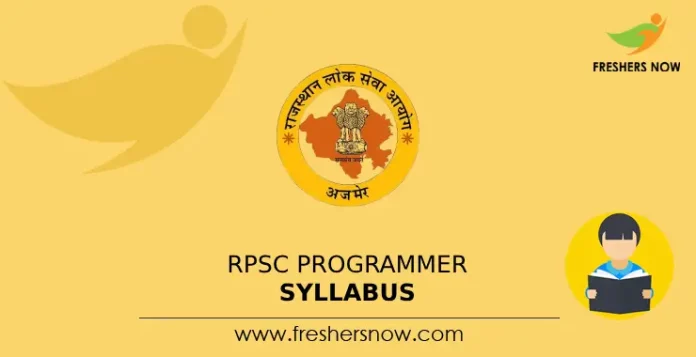
RPSC Programmer Syllabus 2025 PDF Download & Exam Pattern: The Rajasthan Public Service Commission (RPSC) officials has released a notification for Programmer Post with 352 Vacancies available. The Selection process for this post includes Written Exam, Interview. Here, In this article we have given you with RPSC Programmer Syllabus 2025 and Exam Pattern to level up your preparation.
RPSC Programmer Syllabus 2025
The RPSC Programmer Syllabus 2025 helps aspiring candidates to cover all the topics for the Rajasthan RPSC Programmer written exam, which covers topics in two papers. Here, We have provided you the RPSC Programmer Exam Syllabus 2025 in an organized and detailed way to avoid confusion for the aspiring candidates. For detailed information, you can check the below provided link.
RPSC Programmer Syllabus 2025 – Overview
| Latest RPSC Programmer Syllabus 2025 | |
| Organization Name | Rajasthan Public Service Commission (RPSC) |
| Post Name | Programmer |
| Category | Syllabus |
| Selection Process | Written Exam, Interview |
| Location | Rajasthan |
| Official Site | rpsc.rajasthan.gov.in |
RPSC Programmer Exam Pattern 2025
It is strongly recommended that all candidates obtain precise and pertinent details concerning the RPSC Programmer Exam Pattern 2025, as this pattern holds importance for applicants in preparing for the upcoming examination.
| Name of Papers | Marks | Time |
| Paper – I | 100 | 2 Hours |
| Paper – II | 100 | 2 Hours |
RPSC Programmer Exam Syllabus 2025
The RPSC Programmer Exam Syllabus 2025 is provided below. We have given you the topics you need to cover for the written exam:
Paper-1
Reasoning Test & Numerical Analysis & General Knowledge
- Problem solving
- Data Interpretation
- Data Sufficiency
- Logical Reasoning and Analytical Reasoning.
- General Knowledge and Current Affairs relating to India and Rajasthan.
Data Base Management Systems
- ER Diagram, data models- Relational and Object Oriented databases.
- Data Base Design: Conceptual data base design, Normalization Primitive and Composite data types
- concept of physical and logical databases data abstraction and data independence
- data aggregation and Relational Algebra
- Application Development using SQL: Host Language interface, embedded SQL. programming, Stored procedures and triggers and views, Constraints assertions.
- Internal of RDBMS: Physical data organization in sequential, indexed random and hashed files.
- Inverted and multi – list structures, B trees, B+ trees, Query Optimization, Join algorithm.
- Transaction Processing, concurrency control and recovery management.
- Transaction model properties and state serializability.
- Lock base protocols, two phase locking.
Data Communication and Computer Networks
- Computer Network Architecture
- Circuit switching
- Packet And Massage Switching
- Network Structure
- Physical Layer, Data Link Layer, Framing.
- Retransmission algorithms.
- Multiple access and Aloha.
- CSMA/CD and Ethernet.
- High Speed LANs and topologies.
- Broadcast routing and spanning trees.
- TCP/IP Stack.
- IP Networks and Internet
- DNS and Firewalls
- Intrusion Detection and Prevention.
- Transport layer and TCP/IP.
- Network Management And Interoperability.
Paper – II
System Analysis and Design
- System concept: Definition and characteristics, elements and boundaries, types of system development lifecycle, recognition of needs, feasibility study, prototyping, role of system analyst.
- System planning and tools like DFD, data dictionary, decision trees, structured analysis and decision tables.
- IPO charts, structured walkthrough, input output form design, requirement and classification of forms, layout considerations form control, object oriented Design Concepts and methods.
- Software Life Cycle, Software Engineering paradigms.
- System analysis: Feasibility study requirement analysis, Cost benefit analysis, Planning systems, Analysis tools and techniques.
- System Design: design fundamentals, Modular Design, Data and procedural design, object oriented design.
- System Development: Code documentation, Program design paradigms, Efficiency Consideration.
- Verification, Validation and Testing: testing methods, Formal Program Verification, Testing Strategies.
- Software Maintenance: Maintenance Characteristics, Maintainability, Maintenance tasks and side effects.
Programming Concepts
- Introduction: Internet, Java as a tool for internet applications, Byte Code and its advantages.
- Object Oriented Programming and Design: Review of Abstraction, Objects and other basics, Encapsulation, Information hiding, Method, Signature, Classes and Instances, Polymorphism, Inheritance, Exceptions and Exception Handling with reference to object modeling, Coupling and Cohesion in object oriented software.
- Object Oriented Design – Process, Exploration and Analysis.
- Java Programming Basics: Variables and assignments, Input and Output, Data Types and Expressions, Flow of control, Local variables, Overloading Parameter passing, this pointer.
- Java Object Oriented Concepts: Use of file for I/O, Formatting output with stream functions, Character I/O, Inheritance, Public and private members, Constructors for initializations, Derived classes.
- Flow of Control Arrays – Programming with arrays, arrays of classes, arrays as function arguments, Strings, Multidimensional arrays, Arrays of strings, vectors, Base classes.
- Introduction to JSP, RMI, Java Applets and servlets.
- Introduction to Dot Net framework and visual programming interface.
RPSC Programmer Syllabus 2025 Download Link
| RPSC Programmer Syllabus 2025 PDF Download | |
| To Download The RPSC Programmer Syllabus 2025 PDF | Download Syllabus |
Stay Tuned! for more information about the RPSC Programmer Syllabus 2025, Follow our Freshersnow.com Website.



